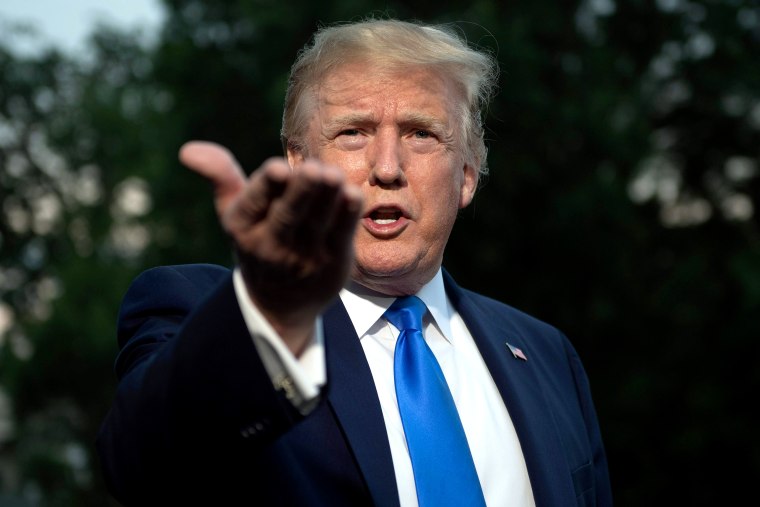WASHINGTON — American and Mexican negotiators failed to reach a deal Wednesday to prevent punitive U.S. tariffs from going into effect over border security, Trump administration officials told NBC News.
Vice President Mike Pence hosted Mexican Foreign Minister Marcelo Ebrard, as well as other top U.S. and Mexican officials, at the White House for a meeting on Wednesday that lasted roughly an hour and a half. According to a senior administration official who attended the meeting, the Mexican delegation offered what the White House viewed as a “good faith,” if “minimalist,” approach to solving the “crisis” at the border.
According to another senior administration official, in order for a deal to be made, the White House is asking Mexico to hold Central American asylum seekers in a "safe third country" designation, rather than letting them cross the US border. Additionally, the White House is also asking Mexico to accept the "Migration Protection Protocols," which require migrants to remain in Mexico until their cases are processed. The administration official was skeptical that a deal could be struck before the Monday deadline, noting that it was likely tariffs would go into effect.
Trump sparked the last-minute meeting between the two countries after announcing on Twitter that he would impose a 5 percent tariff on all Mexican imports beginning this Monday "until Mexico substantially stops the illegal inflow of aliens coming through its territory." The president warned that the tariffs could increase monthly if the Mexican government failed to adequately address illegal immigration, with the penalties potentially climbing as high as 25 percent.
Ebrard told reporters after the Wednesday meeting that he remained optimistic about reaching a deal before the tariffs deadline, pointing out that such tariffs would hurt people in both the U.S. and Mexico.
Trump, who was traveling abroad Wednesday, tweeted that "[p]rogress is being made, but not nearly enough!” He added that negotiations would continue on Thursday “with the understanding that, if no agreement is reached, Tariffs at the 5% level will begin on Monday, with monthly increases as per schedule.”
“The higher the Tariffs go, the higher the number of companies that will move back to the USA!,” he added.
Trump’s plan to hit Mexico with tariffs in order to compel them to sign on to his immigration policies has been met with significant bipartisan blowback.
After meeting with Senate Republicans on Tuesday, Senate Majority Leader Mitch McConnell, R-Ky., asked White House officials to urge Trump to delay the tariffs until the president is back in the country and able to meet with party members to hear out their concerns.
McConnell also told the administration officials that because the policy is so vast they need to hear from the president himself. The senators also wanted to hear from Trump because the officials in the lunch on Tuesday couldn’t answer many of their questions, a separate source familiar with the conversation told NBC News.
Citing negative economic effects, other Republicans warned the White House that Trump would not have the political backing necessary to follow through with his plan. Sen. Ron Johnson, R-Wis., went as far to warn the White House that the Senate would be prepared to vote to disapprove of the president’s action, or even override a potential veto by the president if necessary.
Democrats, for their part, have accused the president of using the unexpected tariff announcement as a mechanism to distract from special counsel Robert Mueller’s findings and ongoing inquiries into potential wrongdoing by the president.
"I don't even think it rises to the level of policy," House Speaker Nancy Pelosi said of Trump’s tariff announcement to reporters on Wednesday. "It's a distraction from the Mueller report. And it’s served its purpose, right? Here we are."


